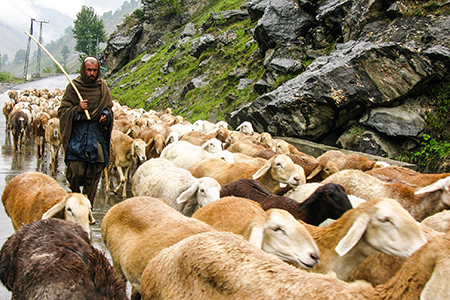 Acts 4:8-12
Acts 4:8-12
 1 John 3:1-2
1 John 3:1-2
 John 10:11-18
John 10:11-18
And time for all the works and days of hands
That lift and drop a question on your plate;
Time for you and time for me,
And time yet for a hundred indecisions,
And for a hundred visions and revisions,
(T.S. Eliot, “Lovesong of J. Alfred Prufrock”)
In “Lovesong”, T.S. Eliot, through the persona of Prufrock, expresses one of the most fundamental concerns that has troubled humanity since the beginning of time, that is, an existential question about one’s purpose in life. This question is dropped on our plate, whether we like it or not, while time continues to disregard our “Indecisions”, “visions” and “revisions”. We are often subjected to the pull from opposing forces that leave us confused and helpless. Prufrock reflects, “Do I dare / Disturb the universe?” We may even avoid making decisions all together out of fear. Similarly, Prufrock admits, “and in short, I was afraid”. Of what is he afraid? “Works and days of hands”? What lies ahead? Unfortunately, avoidance often leads us down a path of disbelief and regrets.
In this Sunday’s readings, God’s outstretched hands extend an intimate invitation to all, regardless of their appearance, strengths or limitations, to return to the fold. It is interesting that God does not only call those whom we think “should” belong, He also extends the same invitation to “other sheep that do not belong to this fold” (Jn 10:16). God’s mercy is boundless and for all, not just a selected few. “See what love the Father has given us, that we should be called children of God” (1Jn 3:1).
The Good Shepherd’s voice is gentle; calling us out of the depth of our darkness and indecisions; offering us a vision that is “marvelous in our eyes” and beyond human imaginations (Ps 118:23). However, we are constantly bombarded with contradictory voices that could only lead us away from the fold into fear. Indeed, it is “better to take refuge in the Lord than to put confidence in princes” (Ps 118:9).
So, what does the Good Shepherd sound like? Where can we find Him?
Perhaps this little story, called “The Great Silence”, may inspire you:
“Would you teach me silence?” I asked.
“Ah!”
He seemed to be pleased. “Is it the Great Silence that you want?”
“Yes, the Great Silence.”
“Well, where do you think it’s to be found?” he asked.
“Deep within me, I suppose. If only I could go deep within, I’m sure I’d escape the noise at last. But it’s hard. Will you help me?” I knew he would. I could feel his concern, and his spirit was so silent.
“Well, I’ve been there,” he answered. “I spent years going in. I did taste the silence there. But one day Jesus came - maybe it was my imagination - and said to me simply, ‘Come, follow me.’ I went out, and I’ve never gone back.”
I was stunned. “But the silence …”
“I’ve found the Great Silence, and I’ve come to see that the noise was inside.”
(Theophane the Monk, “The Great Silence”. Tales of a Magic Monastery, 55)
Our Good Shepherd is “good” because He is utterly selfless. He who “lay down [His] life for the sheep” is the one true voice leading us from darkness to light; slavery to freedom; death to life (Jn 10:15). He invites us to do the same for others: to be light of the world; living signs of God’s love and hope. Therefore, do not be afraid! Dare to “disturb the universe”! May we find the “Great Silence” somewhere deep in our hearts; may we have the courage to say “yes” to our Good Shepherd. “O that today you would listen to his voice! Do not harden your hearts” (Ps 95: 7-8).
